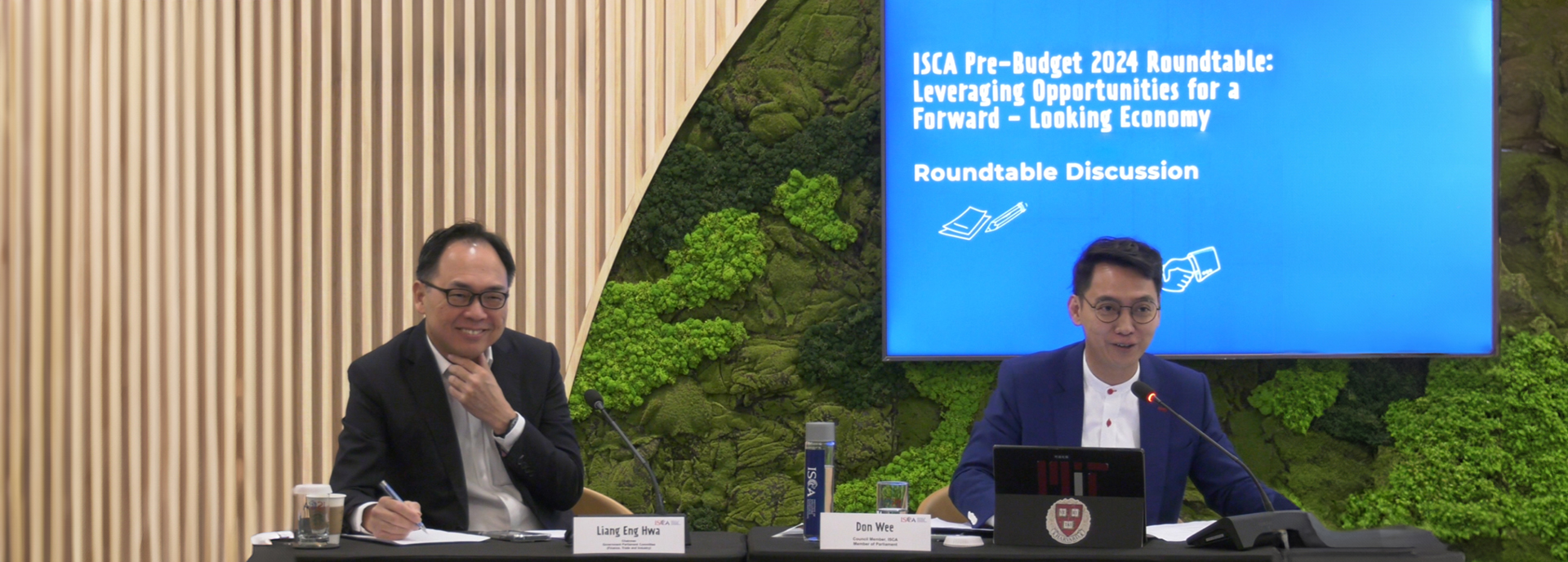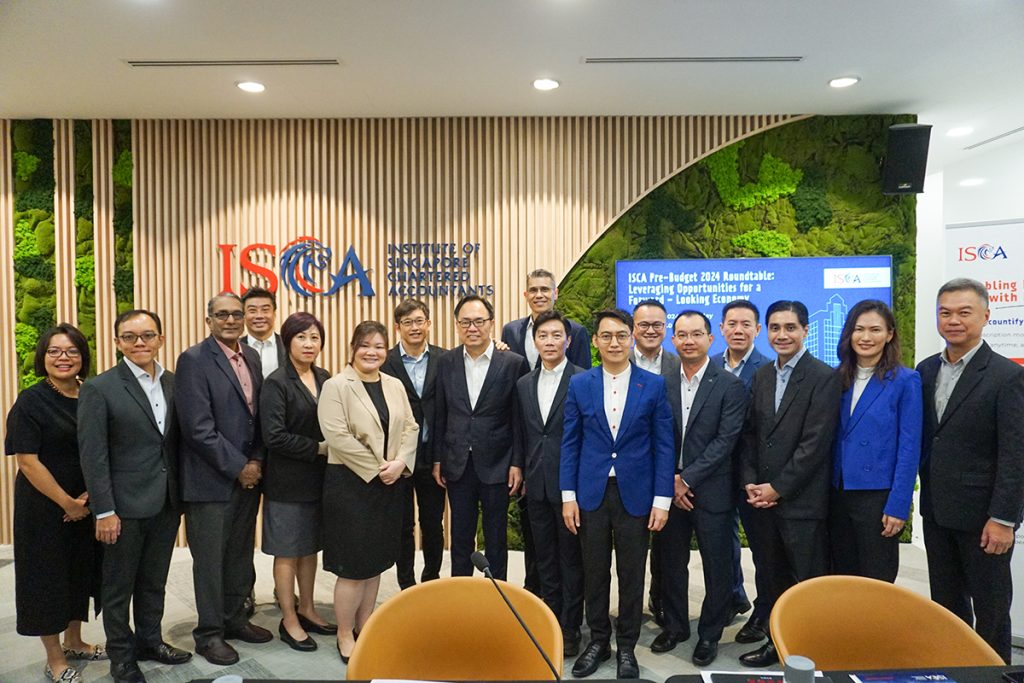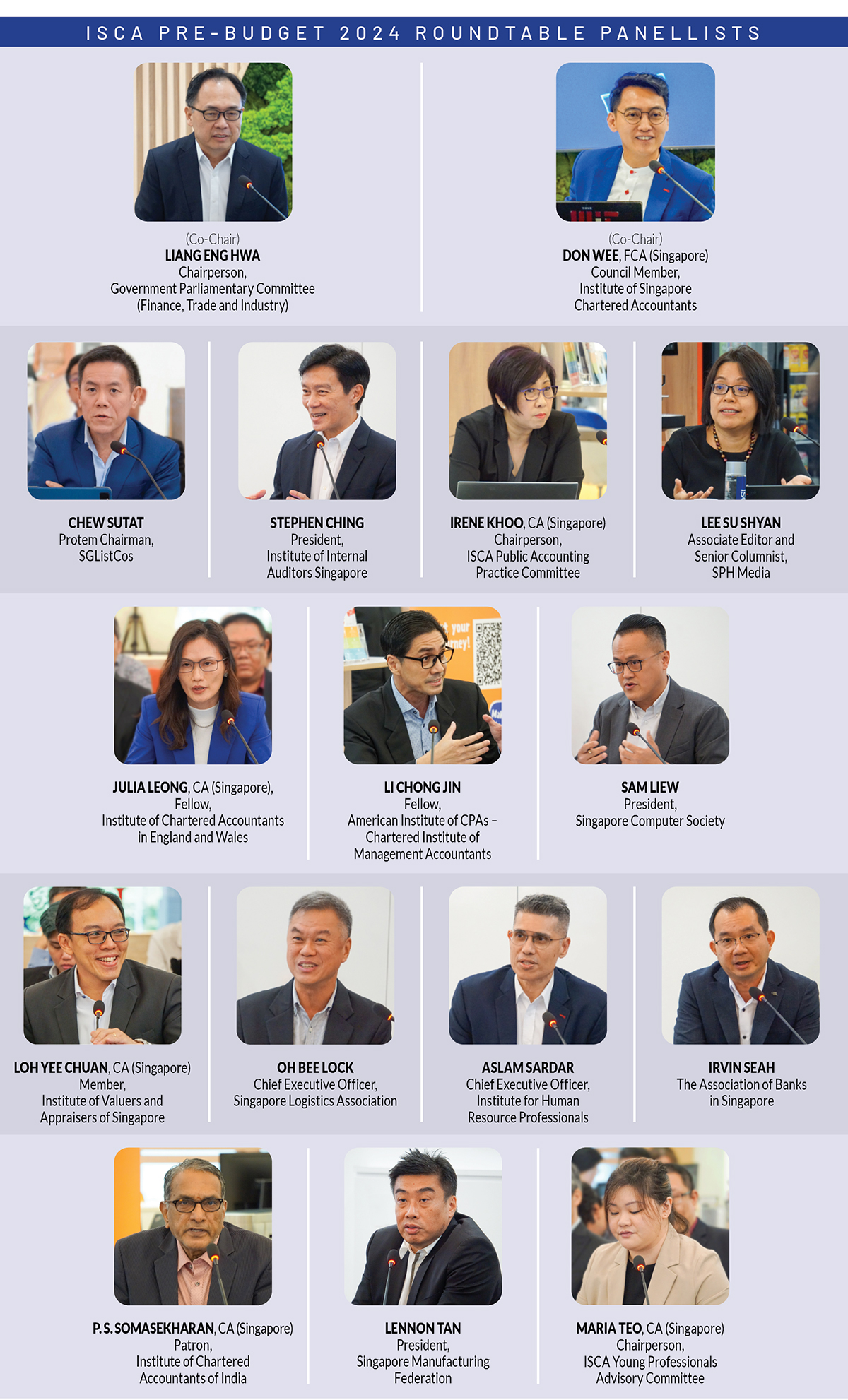

On 11 January 2024, the Institute convened its 15th ISCA Pre-Budget Roundtable at ISCA House. The ISCA signature event, co-chaired by Liang Eng Hwa, Chairperson, Government Parliamentary Committee (Finance, Trade and Industry), and Don Wee, Council Member of ISCA, brought together 14 representatives from trade associations and chambers, professional bodies and businesses to discuss Singapore’s 2024 economic outlook and strategies.
The panellists were cautiously optimistic about 2024, and anticipated a soft landing or normalisation of growth rather than a global recession. They placed emphasis on digital and sustainability transformations as key engines of growth, and highlighted the government’s indispensable role in nurturing these domains.

Stepping into 2024, the panel recognised that the global economic landscape is riddled with uncertainties. From the ongoing geopolitical tensions in Ukraine, Palestine and the Red Sea region to the ebb and flow of election seasons affecting more than half of the world’s population, these complexities demand Singapore’s strategic agility and foresight more than ever.
Amid the challenging external environment, the panellists felt that Singapore’s unwavering reliability, especially evident during the COVID-19 crisis, has enhanced its global business allure. This reliability, coupled with the ongoing shift of companies to Southeast Asia, driven by diversification strategies like China Plus One, reinforces Singapore’s role as a crucial regional hub.
The panel also anticipated a strategic shift in the supply chains, with more focus on regional logistics to mitigate global disruptions. This will further benefit Singapore's position as a regional distribution hub. The government’s role in leveraging Singapore’s strategic strengths in connectivity, technology, and finance is vital in navigating these complexities while seizing emerging opportunities.

The panellists noted that, while inflation shows signs of easing, price increases will continue to be a challenge for Singapore in 2024, particularly in energy and labour. The labour market, especially in high-demand sectors like artificial intelligence (AI), is expected to be fiercely competitive, driving salary increases. Here, the government’s role is critical, particularly in fostering collaboration among the institutes of higher learning (IHL), professional bodies and industries, to align skills supply with market demand.
The panel also discussed the evolving sustainability landscape, marked by initiatives like the European Union’s Carbon Border Adjustment Mechanism (CBAM) that requires exporters to declare their carbon footprint. The changing landscape, the panel added, is set to increase compliance costs, particularly for small and medium-sized enterprises (SMEs). Support measures such as providing accessible sustainability tools, like energy-saving equipment, and subsidies for critical industries, were suggested during the Roundtable, to mitigate these cost pressures and encourage SME innovation and transformation.
In the evolving landscape of Singapore’s labour market, the panel highlighted that companies face a triad of challenges: integrating a multi-generational workforce, transforming business practices in an aging society, and attracting young talents amid the allure of gig work. In this dynamic landscape, business transformation hinges on a strategic and holistic approach to workforce development. The government can play a pivotal role, perhaps by introducing services like Chief Human Resource Officer-as-a-service, to help companies align their human capital strategies with their broader business transformation objectives.
Emphasis on skills-based hiring over traditional academic credentials is increasing. Upskilling and reskilling remained the buzzwords at the Roundtable. To this end, the government can support the shift by nurturing partnerships between itself, professional bodies and businesses to develop trusted skills training programmes and establish nationally recognised qualifications in key areas like sustainability and digital transformation. Additionally, expanding work-study programmes is being explored in the dialogue to connect employers with a broader talent pool.
Sustainability was identified by the panel as being poised for growth in 2024. Companies, especially SMEs, are encouraged to embark on sustainability transformation to attract investments. For the accountancy industry, diversifying services to include sustainability advisory services could open new revenue streams. However, this transition needs sustained governmental support in cost sharing, particularly for training and enhancing capabilities. Funding and subsidies, alongside tax deductions, could incentivise businesses to invest in sustainability. These schemes could be further enhanced by offering more benefits to industry trailblazers.
In 2023, despite geopolitical and economic turbulence, investments in AI had continued, indicating the resilience of digital transformation. The panellists expect this trend to persist in 2024. However, digital transformation, though essential, can be costly, especially for SMEs. To support this, the Roundtable suggested that the government can offer tax incentives and subsidies, and streamline grant criteria. The panel also explored creating an AI hub in Singapore by bringing AI talent from countries with such talent in surplus, for example, China. This ambitious move would also involve creating a robust data ecosystem underpinned by strong governance and trust-building measures at the national level, complete with investment in cybersecurity and disaster recovery.
As the ISCA Pre-Budget 2024 Roundtable wrapped up, it underscored Singapore’s readiness to navigate and shape the future amid global uncertainty. The discussions pivoted around leveraging technological and sustainability transformation as growth opportunities and developing a future-ready workforce, with a strong focus on the critical role of government support in these critical areas.
Concluding, the panellists affirmed the need for strategic agility and collaborative foresight in leveraging opportunities for a dynamic, forward-looking economy.